
Like any other Gen Zer, I’ve grown up hearing about the potential harms of social media: As early as elementary school, teachers and parents warned us of stranger danger, not just in the grocery store, but also online. I was 12 when I got my first social media account on Instagram (even though my hand-me-down iPod Touch didn’t have a camera). In seventh grade, I, and many of my classmates, wrote our final essays for English class on the influence of social media on teenage girls’ body image. I was in junior high when news broke that Facebook user data had been improperly harvested to manipulate U.S. voters. In my high school’s speech and debate club, I learned about dangers of doxxing — posting people’s personal information, like addresses, online as a way to target them for violence. And in my own work here at Sojourners, I regularly see the hate and homophobia that shows up in social media comments.
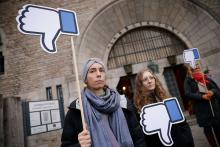
In October of last year, 33 states sued Meta, the parent company of Facebook, Instagram, and WhatsApp, alleging that the company has “concealed the ways in which these Platforms exploit and manipulate its most vulnerable consumers: teenagers and children.” The lawsuit further alleges that the company “repeatedly mislead the public about the substantial dangers of its Social Media Platforms.” The most recent lawsuits make it clear that churches, that are operating large numbers of social media accounts, must do some soul-searching about whether they should stay on platforms that are causing harm to young people.

I WAS SITTING in a large auditorium full of market researchers. A speaker suggested that, by selling wrinkle cream, we were helping to make the world a better place because women would feel better about themselves. I looked around the room, thinking, “Is everyone buying into this? Do people really think this is true, or do they see that it’s just a corporate pep talk?”
I had worked in the world of international market research for nearly 10 years. Though there were a few moments like this one when something just didn’t feel right, in many ways I still didn’t see the issues I see so clearly now — marketing techniques are the air we breathe.
I eventually left my work in marketing to pursue a master’s in social justice and a doctorate in theological ethics. I began to investigate how marketing practices negatively impact how we live as human beings and how we think about marketing in the church. In contemporary society, we tend to view marketing techniques as neutral tools that can be applied in different contexts — whether for businesses, nonprofit fundraising, or church communication. But can we adapt tools that have been developed in the context of capitalistic profit maximization to the mission of the church? Are there fundamental differences in how the church views and relates to human beings?
I had worked in the world of international market research for nearly 10 years. Though there were a few moments like this one when something just didn’t feel right, in many ways I still didn’t see the issues I see so clearly now—marketing techniques are the air we breathe.

In the metaverse, you don’t just curate your surroundings — you also curate your own avatar. One of Zuckerberg’s poker pals, for instance, arrived at the virtual party as a robot wearing a baseball cap.

Although it is hard to imagine a world without Facebook, we must look critically at the implications of its widespread use and the powerful companies that control these platforms — and us. Whether by making election interference easier, selling people’s data, fostering social division by populating feeds with malice, greed, and dissension, social media provides an opportune venue for users to live into our depraved human condition. The consequences of this, however, are not contained in the digital world.

THE PAST DECADE has seen an endless trickle of negative stories about social media—data breaches, Russian bots, cyberbullying, digital radicalization, etc.—so by now almost everyone knows that the amusement and convenience those platforms offer come with a downside. But now a new Netflix documentary, The Social Dilemma, is here to tell us one big thing: It’s worse than we thought. In fact, it’s worse than we could have possibly imagined.
In the film this alarm is raised by many of the very people who helped create the systems they now decry. We’re talking about the guy who invented the “Like” button for Facebook, the guy who designed the recommendation engine for YouTube, the fellow who invented the infinite scroll. One after another these mostly white, mostly male characters come on camera to tell us how badly their proudest accomplishments have gone awry.
The big problem these folks warn us about is that our smartphones constantly collect data (what we buy, what music we play, where we are, who we talk to, etc., ad nauseam) and that data is used to fuel a system of targeted alerts, notifications, and recommendations designed to keep us on a site for as long as possible and deliver us to advertisers who also have that data about us.
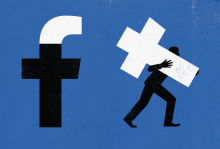
BY NOW THE sins of Facebook, as a social media platform and megacorporation, are well-known. You’ve got invasions of privacy, data breaches, viral falsehoods, livestreamed rapes and murders, and the list goes on.
Well, a few months ago, the volunteer technology committee at the Catholic parish where my wife, Polly, works as social responsibility minister did something about it. They asked their parish council to consider taking the congregation off Facebook entirely and no longer using the platform as a medium of communication. When Polly told me about this, I was a little surprised. Maybe I missed something, but, amid the sporadic calls to “Delete Facebook” in the wake of the company’s various scandals, I hadn’t heard of a religious community actually implementing a boycott.
Once you think about it, the arguments for boycotting Facebook are pretty obvious. When we lend our eyeballs to that platform, we bring it advertising dollars, helping to fund its corrupt and dangerous practices. And what’s worse, the company’s business model makes every person or organization with a Facebook page a recruiter for the company and turns every posted detail of our lives into a product (consumer data) that the company can sell to commercial and political advertisers. When a congregation encourages parishioners to log onto a church Facebook page and share what they find there with interested friends, the church places its members and friends at risk of having personal information exposed to bad actors.
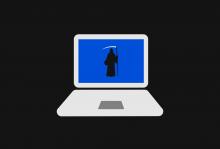
THIS YEAR MARKS the 50th anniversary of the invention of the internet. One day in October 1969, scientists successfully transmitted data from a campus computer at UCLA to a computer at Stanford. Twenty years later, the infrastructure for the World Wide Web went into operation, and the creation of our whole digital universe quickly followed.
Lately, there have been plenty of days that have convinced me that the invention of the internet is one of the worst things that has happened since our first human parents decided that a little bit of “knowledge of good and evil” couldn’t possibly hurt anything.
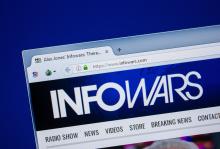
FOR 20 YEARS, Alex Jones, a radio show host and founder of the Infowars website, has been spreading one off-the-wall conspiracy theory after another, and, for the past decade, social media have amplified his voice and his reach to a level his predecessors on the “paranoid Right” could never have imagined. In early August, Facebook and Google-owned YouTube finally took measures to effectively ban Jones from their platforms. But the way they did it raises more questions than it answers about the possibility of restoring respect for truth to public life in the United States.
Way back in the dying days of the 20th century, Alex Jones started his career ranting about the old conspiracy standbys, such as fluoride in our drinking water. But then 9/11 happened, and Jones took his act to a whole new level, claiming that the attacks on the World Trade Center and the Pentagon were really “inside jobs” unleashed by the secret government to launch a global war and suspend civil liberties.
In days gone by, such a theory would have been passed around on mimeographed fliers, and mainstream journalism, shackled by considerations of fact, wouldn’t have touched it. But the social media era has freed us from all that. Now anybody can say anything, and everybody can hear it. Suddenly Alex Jones had an audience of millions for his Facebook pages, his YouTube channel, and his website; this success seemed to egg him on to ever more outrageous pronouncements. Finally, he hit rock bottom with the claim that the Sandy Hook school shooting was faked (to provide a pretext for seizing Americans’ guns) and all those grieving parents were only acting.

TOWARD THE END of August this year, more than 100 million potential U.S. voters were exposed to a fake story about the presidential election that was disguised as hard news. The story, which claimed that Fox News anchor Megyn Kelly had endorsed Hillary Clinton, began on an ultra-Right website called endingthefed.com, but a link to it quickly appeared in the “Trending” box at the top of the Facebook screen. Not only did the fraudulent link slip through Facebook’s legendary screening software, but it stayed there for a full eight hours.
A couple of weeks later, the opposite problem struck when the Facebook robo-censor kicked out posts containing the Pulitzer Prize-winning 1972 photograph of a young naked Vietnamese girl fleeing a U.S. napalm attack. The Facebook Machine didn’t see a gut-wrenching statement about the cruelty of war. It only saw a naked little girl. After an entire day of protests, Facebook finally announced that it would reprogram the software to allow that photo of a naked girl.
Facebook has been cajoled and scolded over the past year by various German officials about the company’s failure to preemptively remove racist material, as German law requires. But Zuckerberg insists Facebook is “a tech company, not a media company.” We build “the tools,” he said, “we do not produce any content.”
The through line in all of these controversies is a persistent question about the role of human decisions versus that of computer algorithms in determining what material appears on Facebook or other digital media intermediaries, including the Google News search engine. Are we just going to see the stories that are generating the most statistically measurable buzz? Or will trained professionals take a hand in guaranteeing that what we see is actually true? The answer has enormous legal consequences for companies such as Facebook. If their human staffs are making choices about the veracity and relative importance of news stories, then digital media platforms may be liable to lawsuits over the content of those stories. But the stakes are even higher for the future of journalism and the functioning of democracy.

RECENTLY, a Facebook troll accused me of liking country singer Carrie Underwood. The troll was ... me.
“I hate to admit it ... but in the interest of full disclosure, I kind of love Carrie Underwood’s ‘Cowboy Casanova,’” said 23-year-old me. Real-time me was horrified.
The indignities kept coming. College junior me: “I was impressed by Mike Huckabee and Ron Paul,” after a GOP debate in South Carolina in 2008. ( Mike Huckabee?!) College senior me, more inscrutably, presumably comparing President Obama’s first inauguration to Woodstock: “Back from Obamastock, living the dream.”
Of all the ways to be internet shamed, I hadn’t counted on my old selves.
Launched in March 2015, Facebook’s feature On This Day collects every status update and photo users have shared on that day, every year, all the way back to the beginning of (Facebook) time.
For a social platform, this function is oddly, endearingly private. Newsfeed and Pages and Groups are where we meet others, but On This Day is where we meet ourselves. The for-your-eyes-only digital diary delivers a daily string of our admissions from years gone by, betting on our appetite for nostalgia and navel-gazing. Sometimes, reading the morning roundup delivers an ego boost. (“I was funny!” I once announced to an empty home.) Other times, I’ve shared things that my present self flat-out refuses to believe.
Facebook is 12 years old and has been with me longer than most close friendships in my life. And it acts like it: On This Day is a best friend eager to remind me how desperately, and how often, I’ve tried to be cool. But it also reflects me at my most earnest, filled with unselfconscious observations on life and tentative explorations into new ideas of justice, identity, and belonging.

Facebook initially responded to the ProPublica report by removing the topics in question from its ad system. But other news reports, including from Slate, then discovered that hateful topics were more widespread in the ad system's targeting capabilities.
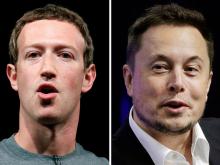
Musk urged a group of governors to proactively regulate AI, which he views as a “fundamental risk to the existence of human civilization.”
“Until people see robots going down the street killing people, they don’t know how to react because it seems so ethereal,” Musk said.
Zuckerberg shot back, saying fearmongering about AI is “irresponsible.”

YOU COULD SAY it’s been the best of times and the worst of times for Facebook Inc. This summer the social media platform’s number of monthly users reached 2 billion. That’s more than one-fourth of the world population, and Facebook has achieved that global reach while still off limits for more than a billion Chinese. More than half of Facebook users log in every day; in the U.S., one out of every five internet page views takes place on Facebook. The company is currently valued at $435 billion.
This success has come despite what should have been a truly dreadful year for the company’s image. Rapes, murders, and suicides have been live-streamed on Facebook. And at least some of those atrocities may have been provoked by the unparalleled opportunity Facebook offers to sociopaths and exhibitionists. In addition, in the past year Facebook was guilty of helping disseminate false information that helped elect Donald Trump. The social network has also been widely named as a major contributor to our increasingly toxic political culture, in which citizens never have to face facts that might contradict their prejudices. A 2016 study from the University of Pittsburgh even found an association between social media use, including Facebook, and depression among young adults.

In Zuckerberg’s mind, the days of institutions like “churches and Little Leagues” are over. Using Facebook’s new artificial intelligence software, the social media giant can organize its users into groups that will serve the same purpose.
While Zuckerberg missed some important purposes a church community serves, he was right about one thing: Christians are leaving their traditional, brick-and-mortar churches — in droves.

According to several sources, the number 40 is used almost 150 times in the Old and New Testaments. Some examples: Jesus was tempted in the wilderness for 40 days and 40 nights. There were 40 years of wilderness-wandering for the Jewish people fleeing bondage in Egypt. Noah and his family were in the ark for 40 days and 40 nights of the flood. There were 40 days and 40 nights of fasting while Moses was on Mount Sinai. Jonah was given 40 days to convert the people of Nineveh. Saul, David, and Solomon reigned 40 years each.

Religion is increasingly viewed as highly politicized, not least due to the way that it is frequently covered in the news. Numerous studies have shown that news stories with emotional cues tend to both gain audience attention and prolong audience engagement.
It may therefore come as no surprise that online debates about religion are packed with emotional cues that evoke strong reactions from those who participate in them. This sets the stage for passionate online debates.

An American missionary priest, killed in Guatemala in 1981, has moved a step closer to being named a Catholic saint, after Pope Francis declared him the first-ever American martyr.
The Rev. Stanley Rother, a priest from the Archdiocese of Oklahoma City, served for nearly 15 years in Guatemala before being shot dead, during the country’s bloody civil war that divided the country from 1960 to 1996.

For many Christians who observe the liturgical season of Advent, leading up to Christmas, an Advent devotional is a beloved companion.
Such devotionals typically include a short Scripture reading and reflection on the birth of Jesus.
But most are “crap,” according to the Rev. Jason Chesnut of Baltimore.
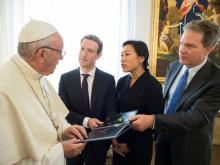
Pope Francis is the king of Twitter and other social media outlets but he’s still not on Facebook, the most dominant digital platform in the world.
Will that change following his meeting with Facebook founder Mark Zuckerberg on Aug. 29?